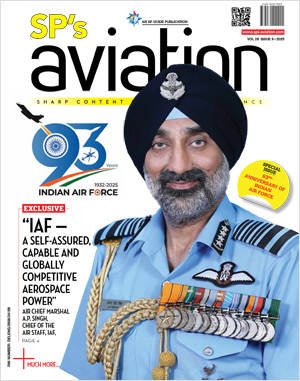INDIAN ARMED FORCES CHIEFS ON OUR RELENTLESS AND FOCUSED PUBLISHING EFFORTS

The insightful articles, inspiring narrations and analytical perspectives presented by the Editorial Team, establish an alluring connect with the reader. My compliments and best wishes to SP Guide Publications.

"Over the past 60 years, the growth of SP Guide Publications has mirrored the rising stature of Indian Navy. Its well-researched and informative magazines on Defence and Aerospace sector have served to shape an educated opinion of our military personnel, policy makers and the public alike. I wish SP's Publication team continued success, fair winds and following seas in all future endeavour!"

Since, its inception in 1964, SP Guide Publications has consistently demonstrated commitment to high-quality journalism in the aerospace and defence sectors, earning a well-deserved reputation as Asia's largest media house in this domain. I wish SP Guide Publications continued success in its pursuit of excellence.
- A leap in Indian aviation: Prime Minister Modi inaugurates Safran's Global MRO Hub in Hyderabad, Calls It a Milestone
- All about HAMMER Smart Precision Guided Weapon in India — “BEL-Safran Collaboration”
- India, Germany deepen defence ties as High Defence Committee charts ambitious plan
- True strategic autonomy will come only when our code is as indigenous as our hardware: Rajnath Singh
- EXCLUSIVE: Manish Kumar Jha speaks with Air Marshal Ashutosh Dixit, Chief of Integrated Defence Staff (CISC) at Headquarters, Integrated Defence Staff (IDS)
- Experts Speak: G20 Summit: A Sign of Global Fracture
On A Slippery Slope

If oil prices do not climb down and government policies on ATF pricing maintain status quo, the air traveler can expect a wet blanket over leisure and business travel. But more significantly, the coming months may prove to be testing times for private airlines and survival could well become an issue. Group Captain A.K. Sachdev from Bangalore elaborates.
A historic aviation event occurred last month. Sasol Limited, the world’s leading producer of synthetic fuels from coal and natural gas, announced that it had become the first company worldwide to receive international approval for 100 per cent synthetic jet fuel produced by its proprietary coal-to-liquids process.
This was the first time ever that such a fuel had been approved for commercial aviation use. Having met the performance standards that aviation quality control demands, the synthetic fuel demonstrated a cleaner burn quality than Aviation Turbine Fuel (ATF). However, overshadowed by a pall of gloom over the closure of several airlines worldwide, the significant event went largely unnoticed.
In the last few weeks, ATA Airlines, Aloha Airlines, Skybus and charter carrier Champion Air in the US have shut down while Delta Airlines debated a merger, possibly with Northwest Airline. In Europe, Alitalia struggled to survive, teetering on the edge of collapse or a bale out. Closer home, Oasis Airline, operating out of Hong Kong since October 2006, ceased operations last month, stranding thousands of passengers in Hong Kong, Britain and Canada. Although there were other causes for these airlines to fold up, the factor that tilted the balance was the rising cost of aviation fuel.
With the falling dollar and speculation in oil becoming attractive, all indicators point towards an oil price well above the $100 (Rs 3,988) mark in the coming months. Reports in the US media would have the world believe that the upward trend in oil prices is fuelled (pun intended) by the increased demand from India and China. Whether that is true or not does not change the fact that the woes of airlines across the world can be expected to keep them working feverishly to combat the rising fuel prices. Government policies across the globe are differentially inclined towards airlines in their respective domains. In India, the airlines are one of the worst affected. This article looks at the threat to the Indian airline industry on account of current fuel pricing policies.





